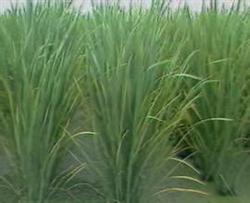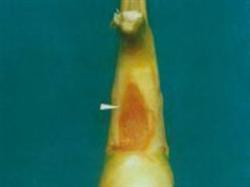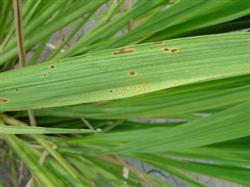Key points of autumn planting techniques of Zizania caduciflora

Autumn planting of Zizania latifolia can make full use of the middle (single) late field, double late field, middle and low yield field, low water land, rotation field of Zizania latifolia, etc., which can improve the yield and benefit of the first harvest year. Compared with traditional spring planting of Zizania latifolia, autumn planting of Zizania latifolia can not only make full use of the free field in winter, but also make full use of the long time in autumn. Spring planting Zizania latifolia can harvest 2 seasons in the same year. The technical points of autumn planting Zizania latifolia are introduced as follows: 1. Timely transplanting autumn planting is generally around mid-October, and the latest cannot be later than early November. 2. Select high-quality pure Zizania latifolia root. The varieties used in production are mainly Zhonglatai, and there are also a few other varieties. The standard of selecting seed root is: on the basis of Zhizao pier which accords with the original variety characteristics of Zhonglatai, requires early maturity, does not grow vigorously, has the same height of cohesive stem, tillers are neat, the pier is not scattered, the number of fruits has reached more than 20, and the maturity is consistent, on this basis, further select the ramets with full bracts, strong white flesh, no male and gray Zhizao on the whole pier, and 2 tillers. 3. Planting method: When transplanting, it should be divided into large and small rows, with large row spacing of 1 meter, small row spacing of 0.8 meters, hole spacing of 0.5-0.6 meters, and no more than 1500 holes per mu. Inclined planting method can be used, the depth of rhizomes and tillers into the ground base shall prevail. 4. Water slurry management Water slurry management is the key to high yield and high efficiency of autumn planting Zizania latifolia. The germination, tillering and pregnancy of Zizania latifolia are all related to temperature. In order to make Zizania latifolia appear on the market early, it is necessary to rely on the management of water to realize the regulation of temperature. The general principle is: shallow water early planting to promote early, medium-term control tiller baking, late deep water to promote pregnancy, winter shallow water not drought. Specific standards are: transplanting survival period to maintain 1.5-3 cm, in order to live roots, root rot prevention. During winter dormancy, keep 3-5 cm shallow water layer to keep soil temperature and prevent rot. Before and after the beginning of spring, that is, in the early stage of germination and tillering, 5-6 cm water layer can be irrigated, and the soil temperature should be kept above 5℃ to promote early germination, early tillering and early rooting. In full tillering later stage, want irrigation 10-14 centimeters deep-water layer, control invalid tillering, still answer at this moment timely bake cropland, pay attention to bake cropland quality. This can not only control ineffective tillering, prevent excessive growth, but also promote Zizania latifolia to harvest roots and set up trees. At the end of the baking field, from the pregnant rice to the pre-harvest stage, the re-irrigation depth reaches 16 cm, and then increases to 23-27 cm with the passage of time, but it should be noted that the water depth cannot exceed the "white eye", so as not to affect the pregnant rice. In the later stage, the deep water layer was used to transform the flesh of Zizania latifolia, making it white and unchanged. During the first harvest period, the water level can be lowered to 3-7 cm to facilitate recovery. During the high temperature period from July to August in summer, the water level should be kept at 13-17 cm to prevent high temperature from harming Zizania latifolia. 5, fertilization method Zizania latifolia fertilization, not only because of the field, because of the seedlings and different, but also to master the "stable, accurate, clever", advocate organic fertilizer, base fertilizer based. "Stable" means that after rice harvest, combined with ploughing and soil preparation, 1250-1500 kg of concentrated fertilizer or manure can be applied per mu, 30 kg of ammonium bicarbonate or 10 kg of urea. When organic fertilizer is insufficient, phosphorus and potassium fertilizer can also be applied appropriately. "Quasi-standard" means that after transplanting, the new quasi-standard should apply early seedling and tiller fertilizer, and fertilizer should be applied at the right time. Generally, about 7 days after transplanting, 1000 kg of human and animal manure shall be applied per mu, 750 kg of human manure or 10 kg of urea shall be applied per mu in the early tillering stage, and fertilizer shall be applied once more at the peak tillering stage after 20 days. "Qiao" that is, in the pregnant period, it is necessary to apply pregnant fertilizer skillfully, topdressing is mainly manures, mu is mainly human and livestock manure, mu is 1500 - 2000 kg of human and livestock manure or 20 - 25 kg of urea, which can make Zizania latifolia tender and white.
- Prev

Field management techniques of Zizania caduciflora
[symptom characteristics] the soft rot of Zizania caduciflora mainly occurred in Zizania caduciflora during transportation, sale and storage after harvest. At first, the infected Zizania caduciflora showed nearly round to amorphous nearly translucent water stains, then the disease spot expanded rapidly, the affected tissue was soft rotten, smelled foul smell, and finally some or most of the tissue rotted and could not be eaten. Suffer from.
- Next

Leaf spot of Zizania latifolia and flax
Flax leaf spot is the main disease of Zizania caduciflora, which is widely distributed and common, and occurs in all areas where Zizania caduciflora is planted. The disease is more serious in summer and autumn, and the diseased plant often reaches 80%, 100%, which obviously affects the production of Zizania caduciflora. Symptoms: the disease is mainly damaged leaves, the spot is brown necrotic spot at first, and then develops into nearly oval to fusiform.
Related
- Where is it suitable to grow horseradish in China? it is expected to see the middle altitude horseradish in Alishan.
- How to prevent tomato virus disease reasonably? (Control methods included)
- Many people like to plant towel gourd on the balcony. What are the main points of this method and management?
- What crops can chili peppers be mixed with?
- Fertilization techniques and matters needing attention in Tomato
- What are the grafting techniques for peach seedlings in spring?
- Harm and control methods of root swelling disease of Chinese cabbage
- What are the pests of sweet potatoes? How to prevent and cure it?
- Symptoms, causes and Control methods of navel Rot in Tomato
- The cause of "Cucumber rotten bibcock" in Farmers' planting Cucumber and its Control Plan

